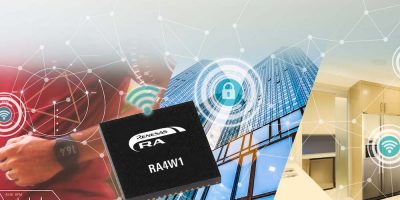Renesas extends Bluetooth 5.0 security to RA 32-bit microcontrollers
Bluetooth 5.0 connectivity has been extended to the RA family of 32-bit microcontrollers by Renesas Electronics, with the introduction of the RA4W1, with an Arm Cortex-M core.
In addition to the 8MHz, 32-bit Arm Cortex-M4 core, it has an integrated Bluetooth 5.0 low energy radio and is delivered in a 56-pin QFN package. The RA4W1 microcontroller and Flexible Software Package (FSP) enables engineers to immediately begin development with Arm ecosystem software and hardware building blocks, says Renesas. FSP features FreeRTOS and middleware for device-to-cloud development. Renesas also points out that options can be replaced and expanded with any other RTOS or middleware.
The RA4W1 microcontroller allows embedded designers to develop safe and secure IoT endpoint devices for industry 4.0, building automation, metering, healthcare, consumer wearable and home appliance applications. It is intended for engineers developing IoT edge devices for wireless sensor networks, IoT hubs, an add-on to gateways and an aggregator to IoT cloud applications.
Sakae Ito, vice president of IoT Platform Business Division at Renesas, said that customers can use the on-chip features, such as Renesas’ Secure Crypto Engine. This feature supports customers with symmetric encryption and decryption, hash functions, true random number generation (TRNG), and advanced key handling with key generation and microcontroller-unique key wrapping for strong key management for IoT security. It also has what is claimed to be best-in-class output power consumption and sensitivity for secure, longer range applications.
The Arm Cortex M4 core and Bluetooth 5.0 core are housed in a 7.0 x 7.0mm 56-pin QFN. The single-chip RA4W1 48MHz microcontroller features 512 kbyte flash memory, 96 kbyte SRAM and connectivity such as USB, CAN and Renesas’ HMI capacitive touch technology.
Bluetooth 5.0 support includes 2 Mbits per second data throughput, all advertising extension functions with maximum advertising length (1,650 byte), periodic advertisements and channel selection algorithm #2 for applications requiring large amounts of traffic. The RA4W1 also offers low peak power consumption at 3.3mA during receiving and 4.5mA (at 0dBm) while transmitting. Renesas claims its sensitivity of -105dBm in 125 kbits per second mode is an industry best and is achieved without additional loss from external components.
Renesas provides several API functions that conform to all standard profiles, including a heart rate profile (HRP), an environment sensing profile (ESP) and an automation I/O profile (AIOP), to allow users to quickly start and speed up prototype development and evaluation.
Renesas’ Smart Configurator GUI generates Bluetooth code and microcontroller peripheral function driver code as well as pin settings for the e2 Studio integrated development environment (IDE). The Renesas QE tool for Bluetooth LE generates programs for custom profiles and embeds them in user application programs to support application program development. The Bluetooth Trial Tool Suite GUI allows users to perform initial wireless characteristics evaluations and Bluetooth functional verification. Users can typically have the RA4W1 evaluation board up and running with the downloadable smartphone applications demo in less than 30 minutes, says Renesas.
Integrating a high-precision, low-speed on-chip oscillator, an RF oscillator adjustment circuit and on-chip matching circuit for easy antenna connection reduces both bills of materials costs and circuit board area.




